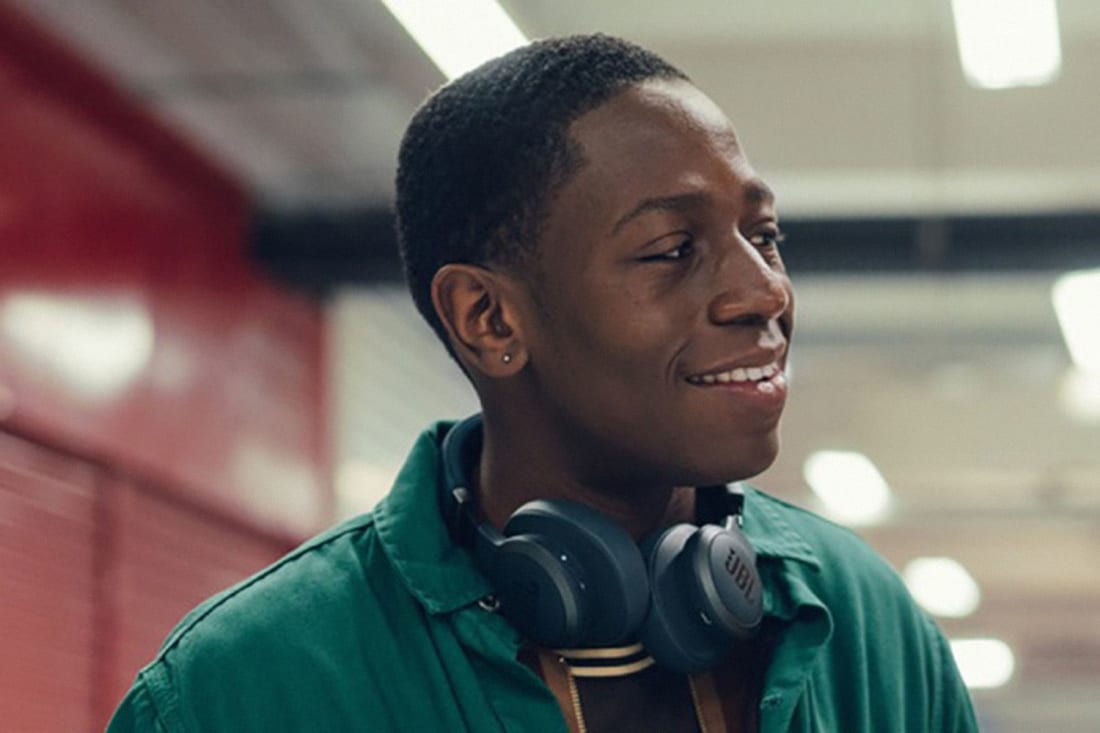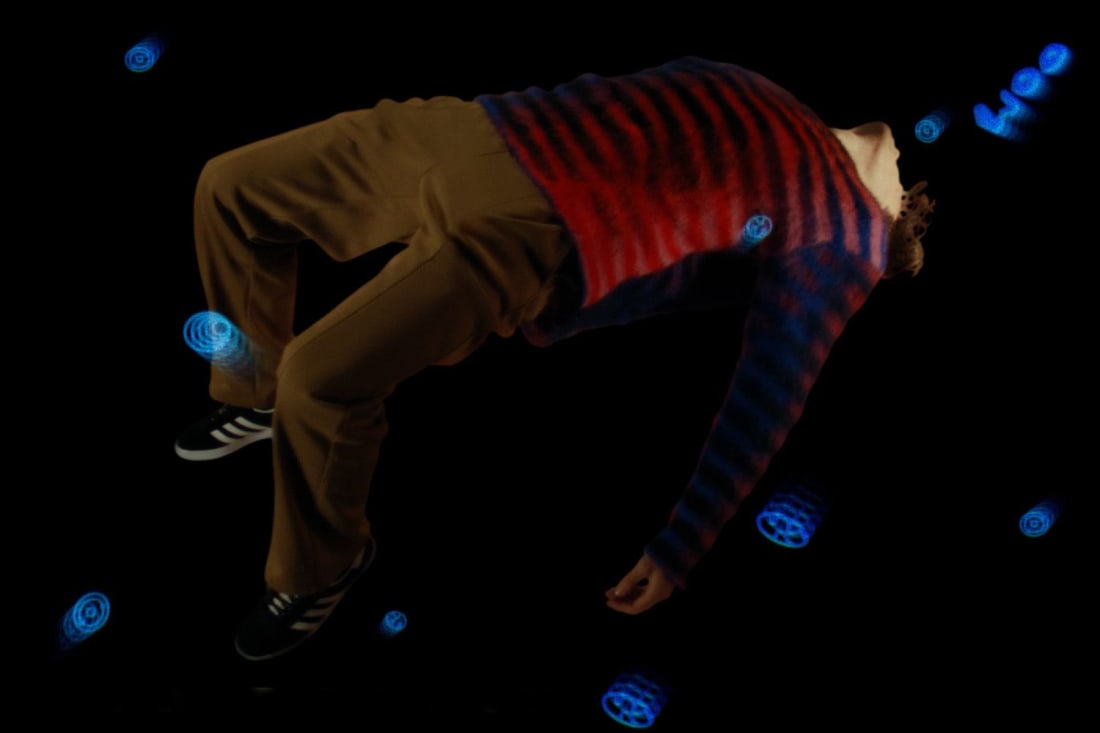incoherent memes in the group chat convinced me i had self-worth
Guys can't always say ‘I love you bro, hope you're well,’ but they can share a meme and sometimes that means exactly the same thing
Guys can't always say ‘I love you bro, hope you're well,’ but they can share a meme and sometimes that means exactly the same thing
This article is part of THE WOONIVERSE ACCORDING TO... Jamie Flatters.
On May 2nd, 2023, my good friend, writer and comedian Scott, sent me an important text: A doctored picture of an M&Ms advertisement promising they were inserting the candies with bodily fluids. Childish? Yes. Exactly what I needed on that day to remind myself I’m worthy? Weirdly, also yes.
Let’s back up a bit: I’m a cis-gendered man. I’m autistic, having been diagnosed as a child. Later in life, I received two other diagnoses: generalised anxiety and clinical depression, two states of being that don’t define my life but can define how I feel about living it.
These neurodivergencies often make me feel like I’m separated from the world around me by a transparent forcefield. I observe and can classify how everyone interacts and survives, but I can never quite manage the same behaviours myself. It feels as if everyone attended a class called “Here’s How to Live Life,” and I missed the class, so they assigned me to one called “Here’s a Forcefield, Good Luck.” This forcefield affects my self-worth pervasively, dredging up feelings of shame and inadequacy. “They’re getting through this so easily,” I wonder about my lucky Earth-sharers with typical brains. “Why can’t I?”
A more constructive question which I now know to ask myself is: “How can I work with, not against, this metaphorical forcefield?” The greatest hits are such for a reason: therapy, medication, and self-care have all improved my quality of life tremendously. But on May 2nd, 2023, a day I was struggling to get through, what I needed was for my friend Scott to send me a meme about sperm. It triggered a flurry of similarly puerile jokes in my all-male group chat, titled “S.A.M.F.,” which, of course, stands for Slow-Ass Mother-Fuckers, because we go running (slowly) every Sunday.
Texts like these made me feel better about what I was going through, better simply about being me. They’re joyful companionship in its purest, most uncut, un-judgemental form. They also make video game writer Chad, a member of another all-male group chat I’m in called The Treats, feel better: “Next to my wife, these chats are by far my most frequent text-based communication. I rely on them to brag about a personal accomplishment, bitch about my boss, or to simply ‘hang out’ for a moment when I’m feeling a little alone.” For Chad, the rapid fire of these group texts means he knows there’s always someone at the other end of the phone. “If I reached out to each of these chats at the same time and none of them responded, the world has likely ended.”
Avatar's Jamie Flatters explores the meaning of self-love in a new, three-part short film series.
In my case, on May 2nd, we didn’t chat directly about what I was going through. And my autism often presents itself in a need for direct communication - if we’re not talking directly about what needs to be talked about, I have a track record of becoming confused and frustrated. So why did these crass, borderline incoherent memes and jokes hit me so directly where otherwise welcome direct address may have fallen short?
“We live in a culture that for generations has told men to stuff down their emotions, to ‘man up’, ‘be tough’ and ‘don’t cry,’” says licensed marriage and family therapist Shannon Behar. “This messaging has led to internalised shame forcing some men to suffer in silence not fully grasping their full range of emotions due to lack of awareness, support and understanding.” Writer, videographer, and member of my S.A.M.F. group text Dewey uses schooling as a metaphor: “We've all been in class as a student, not getting a concept but wanting to stay quiet and not draw attention to how lost we are. Emotionally unavailable men do that every day.”
I remember being chastised when I expressed vulnerability as a child - which is to say, when I wasn’t attempting to mask any of my neurodivergencies, when I would flail my arms because it felt good, cry at the dinner table when I was scared of my food, play inane games over and over because to fixate was to control. To protect myself from further punishment, I used adolescence to build up a kind of stoic, unflappable strength, a congenial disappearance from myself, an assurance to others that I wouldn’t draw attention to my loss.
Allow Avatar's Jamie Flatters to guide you in a calming hypnotherapy experience designed to help uncover a new level of self-love.
Do not listen/watch this while driving or operating machinery, only listen/watch in a place where you can fully relax safely.
But when men text bonkers stuff to each other, it feels like we're all gaining a welcome mat, an opening of a door into a shared strategy of living. “When we find a meme that makes us feel seen and/or understood and then share that with a group, it lets people know it’s something that resonates with us,” says Behar. Scott agrees, saying that “joking around is a way of being creative, which is an act of vulnerability – when you send a meme you think is funny or make a joke yourself, you're going out on a limb saying 'here's something I like' or 'here's something from my brain,' and if that's accepted and embraced, it makes you feel like other parts of you might be embraced as well.” Or, as Dewey puts it more directly, “Guys can't always say ‘I love you bro, hope you're well,’ but they can share a meme of Mario on the grassy knoll with a red shell and that means exactly the same thing.”
In my male group texts, roasts, curses, and memes aren’t just stuff for the sake of stuff - nor are they solely my navel-gazing indications of inclusion. They also serve a practical transitory function, easing the sometimes calloused path toward explicit vulnerability that men are so trained to avoid. My group texts are fluid, sliding in and out of wild jokes and personal pains and avant-garde Photoshopped stills from the film Meet the Parents and visceral concerns about the future. When Scott brought up something vulnerable, we met him with honesty, empathy, and some of the most unhinged jokes we could find. Then, weeks after the conversation subsided, Dewey asked him how he was feeling about it all now, an action that Scott describes as making him “feel really supported and seen without being put on the spot. It made me feel like I was worth checking in on and that I hadn't tainted our friendship by being vulnerable and discussing my flaws.”
“The more we allow men to show up and express themselves honestly and authentically, including the messy and complicated emotions, the more whole we can all become,” says Behar. In my case, the messiness and complications also include silliness, a lubrication for severity, and vice-versa. Chad feels the same way: “I find I’m at my worst mental health-wise when I let a spiral get the best of me. These spirals, like the hiccups, need powerful stimuli to kick the body out of an instinctive defect. There is perhaps no stimuli more powerful than a well-timed image of unspeakable Muppet body horror or an out of context tweet asking how you fuck a Wii U or a comic of a dolphin jumping into a horse’s ass with the lyrics of ‘Country Roads’ laid over top. These images, terrible as they may be, are a medicine of sorts.”
These group texts are medicine for me, too. They make me feel like I can step forward with nothing in my way, because we all welcome any and everything. They make me feel whole.

Welcome to THE WOONIVERSE ACCORDING TO… Jamie Flatters. In this liminal space, we provide an individual a chance to reflect through creativity how to harness their own power to make a positive change in the real world around them. This time around sees Jamie and some of our writers reflect on the idea of self-love and what it means to them. There's even a relaxing hypnotherapy session if you're struggling yourself).



